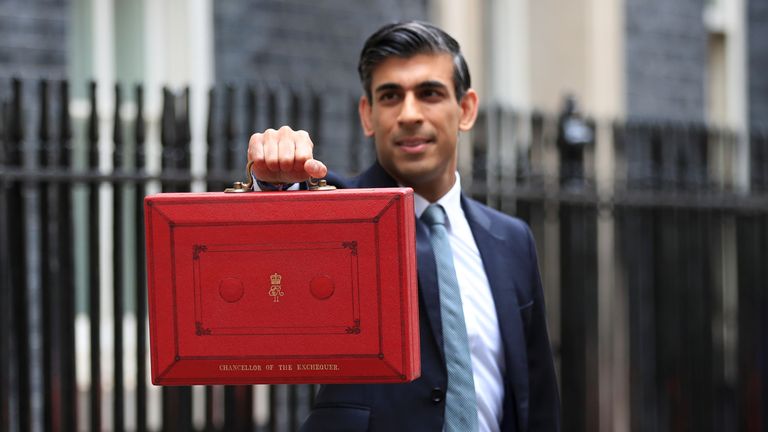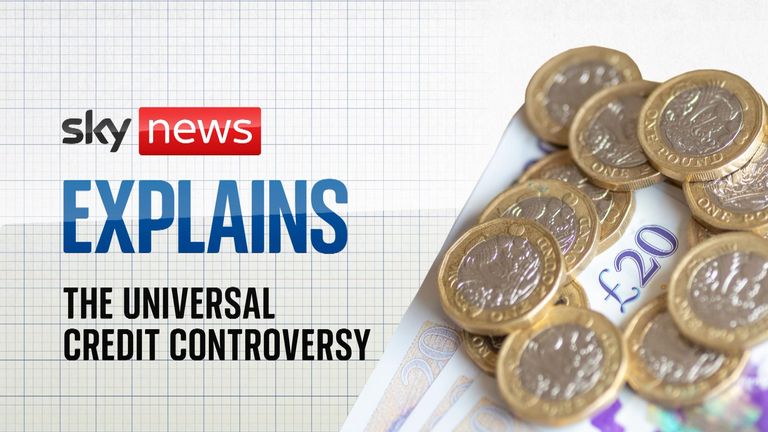Universal Credit taper rate changes announced in budget – what is it and how many will it affect?
The chancellor has announced a change in Universal Credit by altering the “taper rate” after being heavily criticised for cutting the £20 uplift.
Rishi Sunak said in his budget speech that the taper – the amount of Universal Credit (UC) withdrawn for every pound someone earns – will be cut from 63p to 55p.
The change will be introduced “by December” and comes weeks after the £20-a-week increase to payments, introduced in response to the pandemic, came to an end on 6 October.
Will you be better or worse off? Budget announcements and analysis as it happened
According to the Resolution Foundation think tank, 4.4 million households have seen their incomes fall by £1,000 a year as a result of the uplift being cut.
But the chancellor said that was always a temporary measure and the new change will plug that gap.
What is the taper rate?
Once Universal Credit claimants are earning above their work allowance – £293 if including housing support, £515 if not – they start getting less UC as they earn more from work.
Those eligible for a work allowance must either have responsibility for a child or a limited capability for work.
Currently, the taper rate is 63% so for every £1 you earn over the work allowance, UC is reduced by 63p – so they keep 37p in a pound.
It is automatically deducted from UC payments.
How much is the taper rate changing by and how much will it cost the government?
The chancellor has said it will now be 55% instead of 63% so for every £1 in earnings, UC will be reduced to 55p, not 63p – so claimants will keep 45p instead of the current 37p in every pound.
It has not been changed for five years.
Karl Handscomb, senior economist at the Resolution Foundation, said for every 1p reduction for claimants, that costs the government £300-400m.
So, an 8p drop would cost the government £2.4bn-£3.2bn.
How many people will the change affect?
The taper applies to 1.9m families on UC, which leaves nearly half those on UC not benefitting from the change.
Overall, the taper rate change will affect fewer people than the UC uplift as that was provided to everyone on UC, while the taper is not.
Compared with the UC uplift, now a single parent working full-time on the minimum wage with two kids will lose almost £300 in the 18 months from October 2021 (£277).
An adult with no kids on average earnings loses £350 next year due to the personal allowance freeze and National Insurance rise.
Who will benefit and who will not?
Mr Handscomb said cutting the taper will be good for low income families in work who have children but “does nothing” for out of work families.
The Treasury said within five weeks of the changes a single mother of two, renting in Darlington and working a full-time job on the national living wage will see her take-home income increase by £1,200 annually.
And a couple with two children who are renting and have one parent working full-time on the national living wage while the other works 16 hours a week on the national living wage, will be £1,800 a year better off.
Mr Handscomb said; “This is likely better targeting of child poverty rate, but does very little for children in deeper poverty.”
He added that the government will say the lower taper rate is better for incentivising people into work, and “they would be right” but only because there is no “quality evidence on its effect”.
This is because the work incentive will likely not be enough for a single parent who cannot find childcare (which UC pays 85% of) that fits around their job and school.
Source: Read Full Article





